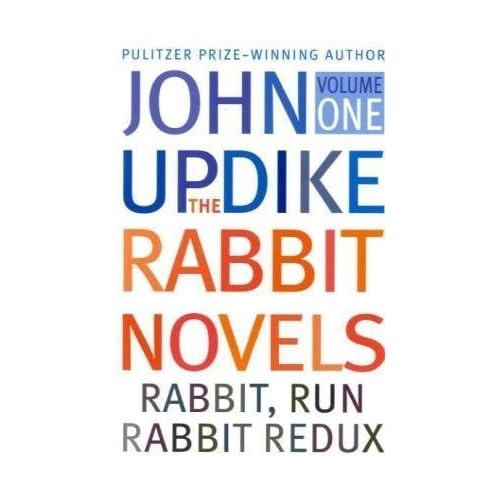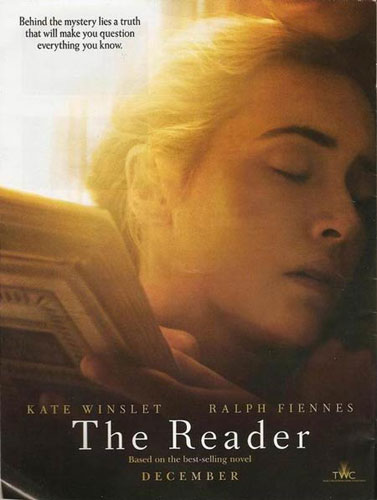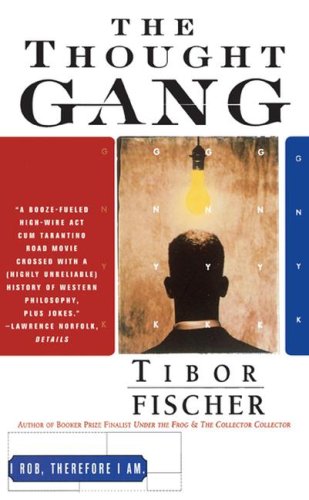Disclaimer: I'm attempting to read every novel that's ever won the Pulitzer Prize. I know. Absurd.
The Rabbit novels capture something special for a reader; a literary journey of four novels that make up the span of a man's adulthood: forty years. Updike's four novels each capture a new decade in the life of Harry Angstrom, and was awarded the Pulitzer Prize for the final two [Rabbit is Rich
(1982) and Rabbit at Rest
(1991)]. I stubbornly read the entire series over a two year period, and am quite proud of that for a simple reason: while I can appreciate this sampling of Updike, I loathed the protagonist.
My hatred is stronger for the earliest, and was slowly chiseled into a patient appreciation. Having said that though, I will never reread these novels. I know Justin Bieber, I should never say never (even if Fievel sang it first).
On that note, what better way to start my blog's exposure to my Pulitzer novel insanity than with a post about all four books! The fun part of this post is that I'm not editing my blurbs to account for the fact that I've completed this project; you're seeing my response to each novel as I progress through the series! I wouldn't expect a high volume of "Series" posts, though... four novels that make me want to throw the books across the room got exhausting.
Rabbit, Run
I'm about 1/3 of the way through the list of Pulitzer novels (better to go slow than rush this), and I couldn't have timed the Rabbit novels better. They're pretty heavy, for my tastes. The style of Updike's writing is amazing to behold; but God, I hate these characters. I don't suppose many people like the weak Janice, and certainly not misogynist Rabbit. The problem of this novel is I can't make any excuses for this jerk who possesses the longest list of flaws I think I've encountered (but would be happy to wait for someone to prover me wrong, perhaps I have previously been this frustrated with a fictional character). I enjoy a novel if I can find someone to relate to. I think Eccles' confusion is the yin to Rabbit's yang, and I enjoy that particular relationship. Otherwise? Oi. Perhaps Rabbit shapes up with age, and let's hope so, for the sake of my Pulitzer list... because there's three more to go.
Rabbit Redux
I finished
Rabbit Redux and feel soooo much more excited about Updike. I must admit to having felt a nice chunk of shame at feeling so grumpy towards
Rabbit Run... but the plot of Redux was so much more full of politics, compassion, and rebellion! Every character bared something brand new, and that for me made Redux so much more enjoyable than Run! I'm pretty sure things will only get better as I read
Rabbit Is Rich and
Rabbit at Rest!
Rabbit is Rich
Harry Angstrom is still a git. He needs a swift punch to the gut... although it probably wouldn't change much. Three books with Updike's selfish, cowardly protagonist amounts to three decades Rabbit-time, and the only thing that's getting me through this series of novels is the writing. The third installment of the Rabbit novels very much merits the Pulitzer because of the amazing fullness of the relationships developed between Rabbit and his immediate family, as well as the more enhanced sense of timing that sets such a specific era around the plot.
I think on first read you can be struck by how much of a horrid person Harry Angstrom is; but as he gets a tad less ego-centric in his old age, the scope of the novel expands, becoming a frighteningly realistic portrait of American politics and white suburbia at the end of the 1970s. I think that sense of timing has improved this particular novel of the series; the period and it's politics seems a more integral part of what is happening to the Angstroms.
Rabbit is thoughtless in his discriminating, snobby tendencies, and leaves no question of society unmolested by his bitter, grumpy thoughts. That's the thing with Updike; he covers pretty much every little thing that a guy could think of in this novel, giving unparalleled insight and really crafting an incredibly whole family, however dysfunctional: drugs, swinging, mid-life crisis, parental resentment, etc. Updike isn't shy about fleshing out Rabbit's deepest thoughts, and while you may hate the guy, I can't help but step back from this novel and be floored by how it all makes for such an intense portrait of an American family. I'm glad Updike kept the whole family so involved in this installment. Nelson is such a mirror to how Harry was in the first, offering brilliant perspective. All said and done, this feels worthy of the Pulitzer, as opposed to the previous two testosterone-propelled adventures.
 Rabbit at Rest
Rabbit at RestI will never say that I enjoyed this series of novels, but the final installment in Rabbit's life made the series very rewarding. Updike's an amazing writer. He captures so many social dynamics; Mt. Judge and Brewer are true American towns, successfully fleshed out with real people. The first two novels were so focused on Rabbit Angstrom specifically that I felt his selfishness and ego were overdone; but through the eyes of his family and friends, so much more an active component of his life, the portrait of the man becomes a richer experience, full of the dynamics and complications that all relationships entail. Yes, Rabbit is probably the meanest, jerkiest dude in literature. Updike continues to let you into his protagonist's psyche without flinching away from any thought, fantasy, or misdeed. That's what makes these novels a rewarding experience; four decades of a guy's life, of American history.
Rabbit Novels Vol. 1
ISBN: 9780345464569
Rabbit Novels Vol. 2
ISBN: 9780345464576






